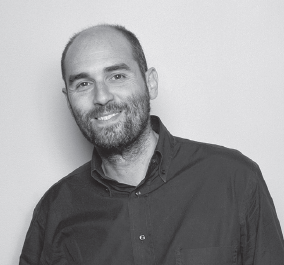 Frog Design Executive Creative Director Fabio Sergio has published a must-read essay on healthcare innovation over at Frog Design's site, arguing not only that developments like Big Data and wearable devices will improve healthcare, but also that they will -- and should -- fundamentally change the healthcare system and the meaning of roles like patient, caregiver, and healthcare professional.
Frog Design Executive Creative Director Fabio Sergio has published a must-read essay on healthcare innovation over at Frog Design's site, arguing not only that developments like Big Data and wearable devices will improve healthcare, but also that they will -- and should -- fundamentally change the healthcare system and the meaning of roles like patient, caregiver, and healthcare professional.
Sergio, who has worked with Frog clients Novartis, Johnson & Johnson, and UNICEF, says new players are having an increasing influence over the future of healthcare. Designers who control how healthcare is accessed, Sergio says, are "strategically helping to make the larger-scale experience of healthcare more engaging and effective." Telecom companies, as well, have the opportunity to become players in the healthcare space.
"Healthcare was once a domain of hardcore healthcare-focused players," Sergio writes. "Today, there are numerous non-traditional health service providers — Nike, Fitbit, Microsoft, Qualcomm — moving quickly into this space. And with health-related services like Asthmapolis or [Massive Health's] The Eatery sitting on an iPhone or Android screen beside Twitter, YouTube, or Facebook applications, the boundaries between lifestyle and life-care are blurring, perhaps even fading away."
Sergio makes the case that this blurring of lifestyle and care is dovetailing with an institutional emphasis on prevention rather than treatment.
"In most cases and countries the quality of a healthcare system is only measured when treating a disease, and only then the economic incentives of reimbursement come into play to propel the system forward. The key to make healthcare sustainable in the future will be to understand what incentives will be needed to tip the entire system towards prevention," he writes.
Rather than characterizing the shift in healthcare as from patient to consumer, Sergio argues it should be conceptualized as a shift "from prescription to choice." Patient communities and online diagnosis tools empower people by giving them information, so everyone can interact with the healthcare system not as a patient or as a consumer, but simply as a person.
"In the next chapter of the industry formerly known as healthcare, people will start to see the care of their health as a lifelong narrative," he writes. "Science is now telling us how our life stories might begin as early as in the womb, when we are affected by what our mothers eat when they are pregnant, and effective storytelling is likely to become a key ingredient in any effective healthcare solution. These stories will be about people’s lives, not about the diseases that happen to affect them. Although there will be more data available about people’s health experiences, they will learn and demand to be understood and spoken with as human beings and individuals, and not be considered a statistic."
Sergio reiterates the often-made point that Big Data is not as important as the interpretation of that data, and suggests (without naming names) that some services that attempt to create behavior change by tracking health data and providing it to the users are doomed to fail if they don't find a way to make that data meaningful and relevant.
Addressing the question of the necessity of the yearly physical, Sergio predicts the doctor's visit itself isn't going away, but it will be conducted differently: possibly remotely, via video messaging, but probably with a shared information display, with "conversations facilitated and sustained by information shown on displays that can be interacted with by both parties." The presence of home monitoring devices, from fitness trackers and connected weight scales to home blood pressure monitors and iPhone EKGs, will introduce more data into the conversation, and that data will be openly shared between both parties.
Sergio also acknowledges how difficult change is for a system as entrenched and risk-averse as healthcare. Nonetheless, he suggests that the shifts he's describing have already begun, and it's the responsibility of everyone in digital health to keep pushing on the status quo, to bring about a new future for healthcare.
















